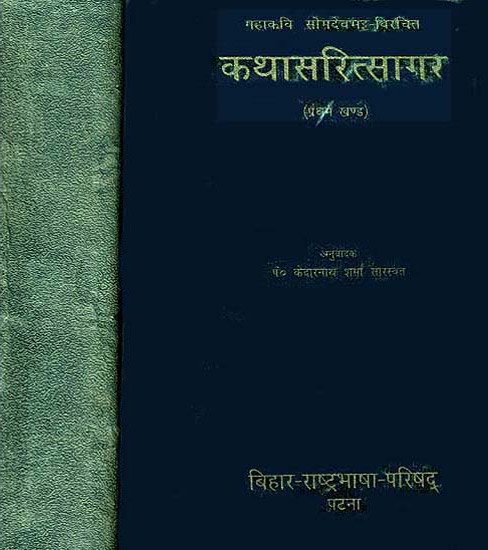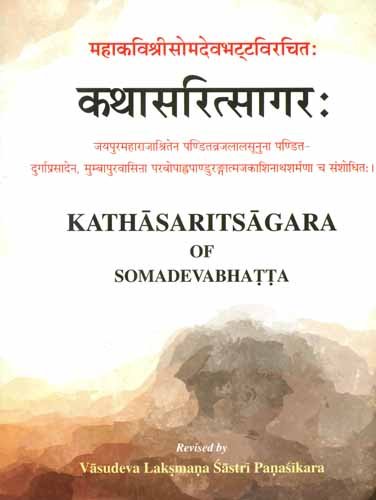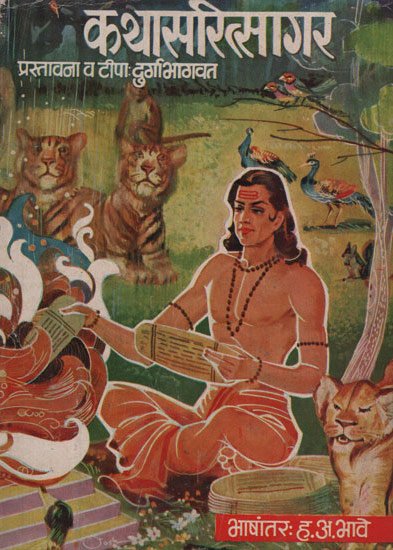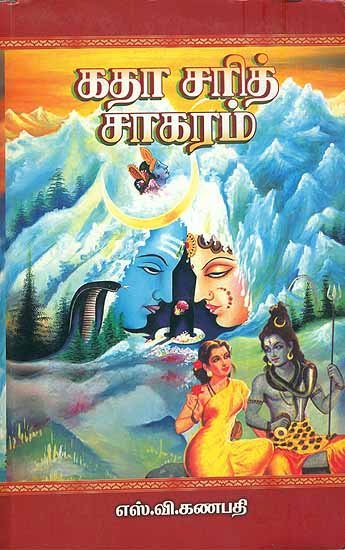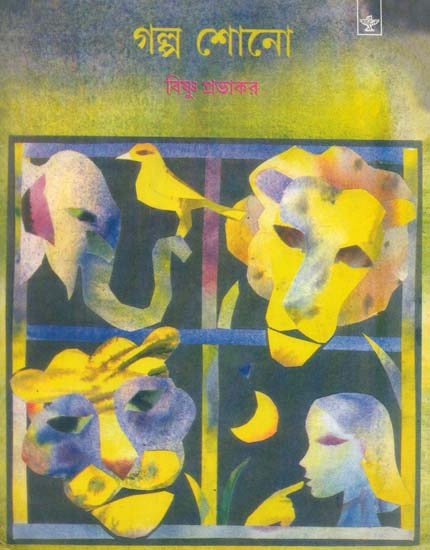Kathasaritsagara [sanskrit]
by C. H. Tawney | 2014 | 226,424 words | ISBN-13: 9789350501351
The Sanskrit edition of the Kathasaritsagara referencing the English translation and grammatical analysis. Written by Somadeva and dating from the 12th century, the Kathasaritsagara (or Katha-sarit-sagara) represents an epic legend narrating the adventures of Naravahanadatta as he strives to become the destined emperor of the Vidyadharas. Alternative titles: (Kathāsaritsāgara, कथासरित्सागर, Kathā-sarit-sāgara)
Verse 10.1.176
एवं नरेश वनिताहृदये न जातु कूटादृते वसति सत्यकथालवो ऽपि ।
तत्सार्थसाध्यगमनासु सदैव तासु शून्याटवीष्विव रमेत न भूतिकामः ॥ १७६ ॥
evaṃ nareśa vanitāhṛdaye na jātu kūṭādṛte vasati satyakathālavo 'pi |
tatsārthasādhyagamanāsu sadaiva tāsu śūnyāṭavīṣviva rameta na bhūtikāmaḥ || 176 ||
The English translation of Kathasaritsagara Verse 10.1.176 is contained in the book The Ocean of Story by C.H. Tawney. This book is available online or you could buy the latest edition:
Read online Buy now! The English translation by C.H. Tawney (2014)
Glossary of Sanskrit terms
Note: This extracts Sanskrit terms and links to English definitions from the glossary, based on an experimental segmentation of verse (10.1.176). Some terms could be superfluous while some might not be mentioned. Click on the word to show English definitions.
Evam, Eva, Naresha, Vanitri, Vanita, Ahridaya, Jatu, Kuta, Rite, Rita, Riti, Vasati, Vasat, Satyaka, Tha, Alu, Api, Tat, Tad, Sartha, Sadhya, Gamana, Sadaiva, Shunya, Atavi, Iva, Bhutikama,
Analysis of Sanskrit grammar
Note: this is an experimental feature and only shows the first possible analysis of the Sanskrit text (Kathasaritsagara Verse 10.1.176). If the system was successful in segmenting the sentence, you will see of which words it is made up of, generally consisting of Nouns, Pronouns, Verbs, Participles and Indeclinables. Click on the link to show all possible derivations of the word.
- Line 1: “evaṃ nareśa vanitāhṛdaye na jātu kūṭādṛte vasati satyakathālavo 'pi ”
- evam -
-
evam (indeclinable adverb)[indeclinable adverb]evam (indeclinable)[indeclinable]eva (noun, masculine)[adverb], [accusative single]eva (noun, neuter)[adverb], [nominative single], [accusative single]evā (noun, feminine)[adverb]
- nareśa -
-
nareśa (noun, masculine)[compound], [vocative single]
- vanitā -
-
vanita (noun, masculine)[compound], [vocative single]vanita (noun, neuter)[compound], [vocative single]vanitṛ (noun, masculine)[nominative single]vanitā (noun, feminine)[nominative single]√van (verb class 1)[periphrastic-future active third single]√van (verb class 8)[periphrastic-future active third single]
- ahṛdaye -
-
ahṛdaya (noun, masculine)[locative single]ahṛdaya (noun, neuter)[nominative dual], [vocative dual], [accusative dual], [locative single]ahṛdayā (noun, feminine)[nominative dual], [vocative single], [vocative dual], [accusative dual]
- na -
-
na (indeclinable particle)[indeclinable particle]na (noun, masculine)[compound], [vocative single]na (noun, neuter)[compound], [vocative single]
- jātu -
-
jātu (indeclinable)[indeclinable]jātu (noun, masculine)[compound], [adverb]jātu (noun, feminine)[compound], [adverb]jātu (noun, neuter)[compound], [adverb], [nominative single], [vocative single], [accusative single]jātū (noun, masculine)[adverb], [vocative single]jātū (noun, feminine)[compound], [adverb], [vocative single]jātū (noun, neuter)[compound], [adverb], [nominative single], [vocative single], [accusative single]
- kūṭād -
-
kūṭa (noun, masculine)[adverb], [ablative single]kūṭa (noun, neuter)[adverb], [ablative single]
- ṛte -
-
ṛte (indeclinable preposition)[indeclinable preposition]ṛte (indeclinable)[indeclinable]ṛta (noun, masculine)[locative single]ṛta (noun, neuter)[nominative dual], [vocative dual], [accusative dual], [locative single]ṛtā (noun, feminine)[nominative dual], [vocative single], [vocative dual], [accusative dual]ṛti (noun, feminine)[vocative single]ṛti (noun, masculine)[vocative single]
- vasati -
-
vasati (noun, feminine)[compound], [adverb]vasati (noun, masculine)[compound], [adverb]vasati (noun, neuter)[compound], [adverb], [nominative single], [vocative single], [accusative single]vasatī (noun, feminine)[adverb], [vocative single]√vas -> vasat (participle, masculine)[locative single from √vas class 1 verb]√vas -> vasat (participle, neuter)[locative single from √vas class 1 verb]√vas (verb class 1)[present active third single]
- satyaka -
-
satyaka (noun, masculine)[compound], [vocative single]satyaka (noun, neuter)[compound], [vocative single]
- thā -
-
tha (noun, masculine)[compound], [vocative single]tha (noun, neuter)[compound], [vocative single]
- alavo' -
-
alu (noun, feminine)[nominative plural], [vocative plural]
- api -
-
api (indeclinable preposition)[indeclinable preposition]ap (noun, neuter)[locative single]api (Preverb)[Preverb]
- Line 2: “tatsārthasādhyagamanāsu sadaiva tāsu śūnyāṭavīṣviva rameta na bhūtikāmaḥ ”
- tat -
-
tat (indeclinable correlative)[indeclinable correlative]tad (noun, neuter)[compound], [nominative single], [accusative single]
- sārtha -
-
sārtha (noun, masculine)[compound], [vocative single]sārtha (noun, neuter)[compound], [vocative single]
- sādhya -
-
sādhya (noun, masculine)[compound], [vocative single]sādhya (noun, neuter)[compound], [vocative single]√sidh -> sādhya (participle, masculine)[compound from √sidh]√sidh -> sādhya (participle, neuter)[compound from √sidh]√sādh -> sādhya (absolutive)[absolutive from √sādh]√sādh -> sādhya (absolutive)[absolutive from √sādh]√sādh -> sādhya (absolutive)[absolutive from √sādh]√sidh -> sādhya (absolutive)[absolutive from √sidh]√sādh -> sādhya (participle, masculine)[vocative single from √sādh class 1 verb], [vocative single from √sādh class 4 verb], [vocative single from √sādh class 5 verb]√sādh -> sādhya (participle, neuter)[vocative single from √sādh class 1 verb], [vocative single from √sādh class 4 verb], [vocative single from √sādh class 5 verb]√sidh -> sādhya (participle, masculine)[vocative single from √sidh]√sidh -> sādhya (participle, neuter)[vocative single from √sidh]√sādh (verb class 4)[imperative active second single]
- gamanāsu -
-
gamanā (noun, feminine)[locative plural]
- sadaiva -
-
sadaiva (noun, masculine)[compound], [vocative single]sadaiva (noun, neuter)[compound], [vocative single]
- tāsu -
-
tā (noun, feminine)[locative plural]sā (noun, feminine)[locative plural]
- śūnyā -
-
śūnya (noun, masculine)[compound], [vocative single]śūnya (noun, neuter)[compound], [vocative single]śūnyā (noun, feminine)[nominative single]
- aṭavīṣvi -
-
aṭavī (noun, feminine)[locative plural]
- iva -
-
iva (indeclinable adverb)[indeclinable adverb]iva (indeclinable)[indeclinable]
- rameta -
-
√ram (verb class 1)[optative active second plural], [optative middle third single]
- na -
-
na (indeclinable particle)[indeclinable particle]na (noun, masculine)[compound], [vocative single]na (noun, neuter)[compound], [vocative single]
- bhūtikāmaḥ -
-
bhūtikāma (noun, masculine)[nominative single]
Other editions:
Also see the following editions of the Sanskrit text or (alternative) English translations of the Kathasaritsagara Verse 10.1.176
Kathasaritsagar
by Kedarnath Sharma Saraswat (2005)
The Only Edition with the Sanskrit Text and its Hindi Translation (An Old and Rare Book) Set of 3 Vol.
Buy now!
Kathasaritsagara of Somadeva Bhatta (Sanskrit Text Only)
by Vasudeva Laksmana Sastri (2013)
Katha Sarit Sagar in Marathi
by H. A Bhave (1995)
Set of 5 Volumes; Published by Varada Books, Pune. 2256 pages (Throughout B/W Illustrations).
Buy now!
Katha Sarit Sagara (Tamil)
by S. V. Ganapati (எஸ். வி. கணபதி) (2014)
[கதா சரித் சாகரம்] Published by Alliance Publications.
Buy now!
Galpa Shono
by Abhijit Chattopadhyay (2014)
[গল্প শোনো] Galpa Shono: Bengali Translation of 'Suno Kahani From Katha Sarit Sagar'; 9788126015436; Published by Sahitya Akademi, Delhi.
Buy now!Preview of verse 10.1.176 in Bengali sript:
এবং নরেশ বনিতাহৃদযে ন জাতু কূটাদৃতে বসতি সত্যকথালবো ঽপি ।
তত্সার্থসাধ্যগমনাসু সদৈব তাসু শূন্যাটবীষ্বিব রমেত ন ভূতিকামঃ ॥ ১৭৬ ॥
![Kathasaritsagara [sanskrit] - book cover](/uploads/a/Katha-Sarit-Sagara.jpg)
